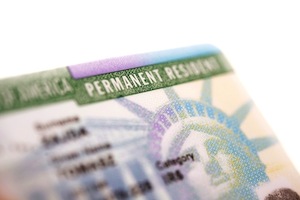 When non-citizens enter the United States, sometimes the U.S. Immigration and Customs Enforcement (“ICE”) will detain non-citizens for various reasons. Upon detention, one of the first factors that ICE officials will determine is whether a noncitizen has the right to a bond hearing.
When non-citizens enter the United States, sometimes the U.S. Immigration and Customs Enforcement (“ICE”) will detain non-citizens for various reasons. Upon detention, one of the first factors that ICE officials will determine is whether a noncitizen has the right to a bond hearing.
A bond hearing is a process in front of an immigration judge during which one can ask to be released on a bond. A bond allows an individual to be released upon payment of money or upon conditional parole. Under the law, however, not everyone who is detained is entitled to a bond hearing
Mandatory Detention
Under Section 236(c) of the Immigration and Nationality Act, certain non-citizens upon entry into the United States must be detained when they come into the custody of ICE. This known as “mandatory detention.” These individuals are not eligible for a bond hearing and do not have to be released.
When an illegal immigrant has committed a certain offense, ICE is permitted to detain him or her without hearing. These offenses include:
- Certain crimes of moral turpitude;
- Terrorist activity;
- Prostitution;
- Human trafficking;
- Money laundering;
- Aggravated felony;
- Espionage, sabotage, or treason; or
- Drug abuse or addiction.
This is not an exhaustive list of the crimes for which ICE is permitted detain an illegal immigrant without a bond hearing. Furthermore, certain offenses do not require a conviction; instead, all that may be required is an admission of guilt or sufficient evidence to establish guilt.
What Should I Do if I Am Detained?
If you are detained by immigration authorities and believe you are being improperly detained without a bond hearing, you can request what is known as a “Joseph Hearing.” During a Joseph Hearing, an immigration judge will determine if the illegal immigrant being held is subject to mandatory detention and is in fact deportable.
The purpose of a Joseph Hearing is to prevent arbitrary deprivations of an immigrant’s liberties. A judge will consider whether the detention is meant “not to facilitate deportation or to protect against risk of flight or dangerousness, but to incarcerate for other reasons.”
ACLU Files Class Action Lawsuit Challenging Mandatory Detention
The American Civil Liberties Union recently filed a class action lawsuit arguing that certain non-citizens were being improperly detained under the mandatory detention program without the opportunity to be heard. The action challenged the lawfulness of detaining non-citizens based on offenses that were committed many years ago.
In an important ruling, the court held that these groups of non-citizens were entitled to a bond hearing and “did not pose a flight risk or danger warranting continued detention.” A representative for the ACLU stated that the decision prevents “mandatory lock-up simply because they had run-ins with criminal justice system many years ago. The court’s decision prevents the irrational, unjust detention of these individuals without basic due process of law.”
Contact a Chicago Immigration Attorney
If you have any questions about mandatory detention or deportation, our experienced Chicago immigration attorneys can help guide you through this process. Our deportation defense attorneys want to help protect your rights. Contact our office today at 773-364-6626 for a free consultation. We have several locations throughout the Chicagoland area.




 A pesar de los mitos que abundan con respecto a la ley
A pesar de los mitos que abundan con respecto a la ley  Despite the myths that abound regarding the
Despite the myths that abound regarding the  Cuando las guerras explotan con poca o ninguna advertencia, su familia vera la necesidad de huir o buscar refugio en lugares lejos de casa. Si se produce un evento trágico pero temporal en su país de origen, usted podría
Cuando las guerras explotan con poca o ninguna advertencia, su familia vera la necesidad de huir o buscar refugio en lugares lejos de casa. Si se produce un evento trágico pero temporal en su país de origen, usted podría  When wars break out with little to no warning, families may need to flee or find safe harbor in places away from home. If a tragic but temporary event occurs in your home country, you may be able to
When wars break out with little to no warning, families may need to flee or find safe harbor in places away from home. If a tragic but temporary event occurs in your home country, you may be able to  Pasar por los procedimientos de una corte de inmigración es muy difícil y para la mayoría profundamente alarmante. Si un juez se niega otorgar la cancelación de remoción, todo el trabajo y preparación puede terminar en lágrimas. Sin embargo, hay una manera de
Pasar por los procedimientos de una corte de inmigración es muy difícil y para la mayoría profundamente alarmante. Si un juez se niega otorgar la cancelación de remoción, todo el trabajo y preparación puede terminar en lágrimas. Sin embargo, hay una manera de  Going through immigration court proceedings is very difficult, and for most, profoundly frightening. If a judge refuses to grant cancellation of removal, all the work and preparation may end in tears. However, there is a way to
Going through immigration court proceedings is very difficult, and for most, profoundly frightening. If a judge refuses to grant cancellation of removal, all the work and preparation may end in tears. However, there is a way to  Un residente permanente legal
Un residente permanente legal A
A  En los últimos años, Illinois ha promulgado leyes y tomado varios pasos para hacer al estado más amigable y servicial para
En los últimos años, Illinois ha promulgado leyes y tomado varios pasos para hacer al estado más amigable y servicial para